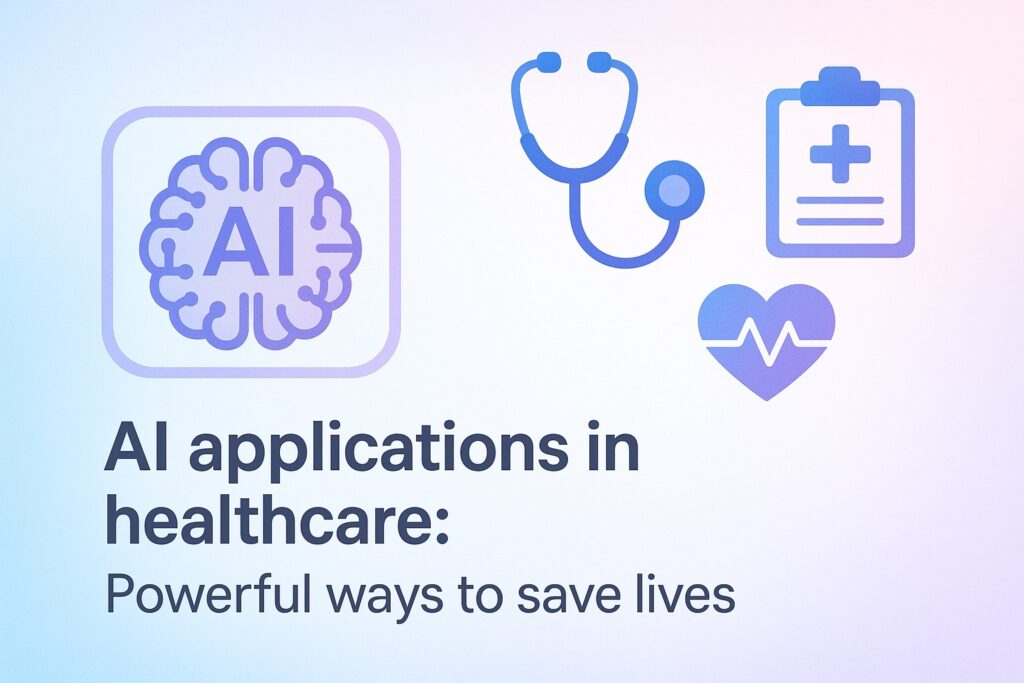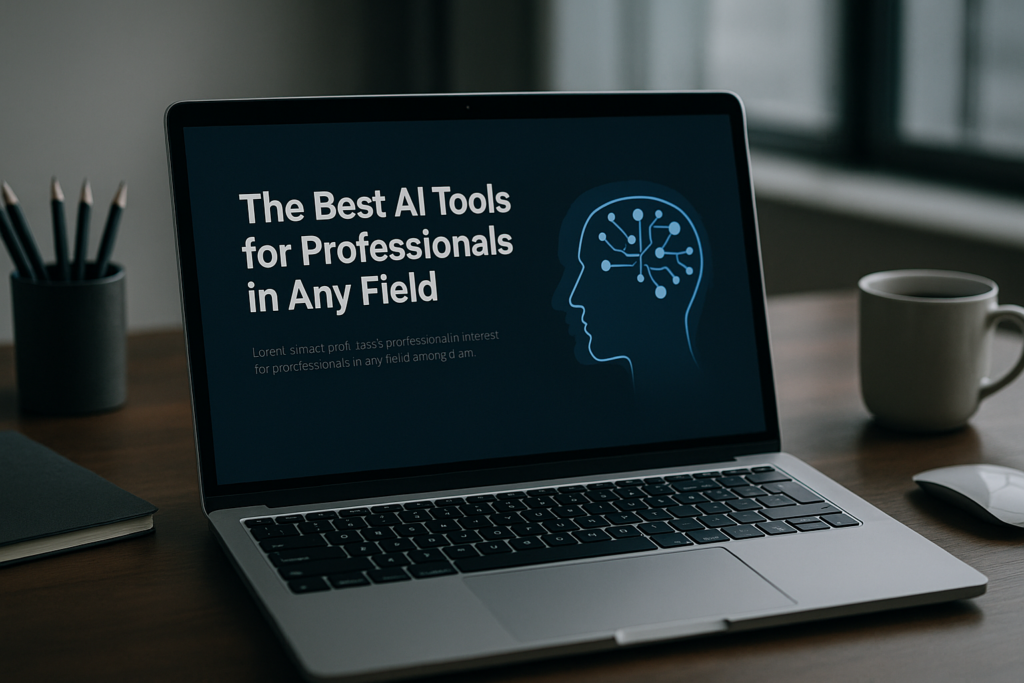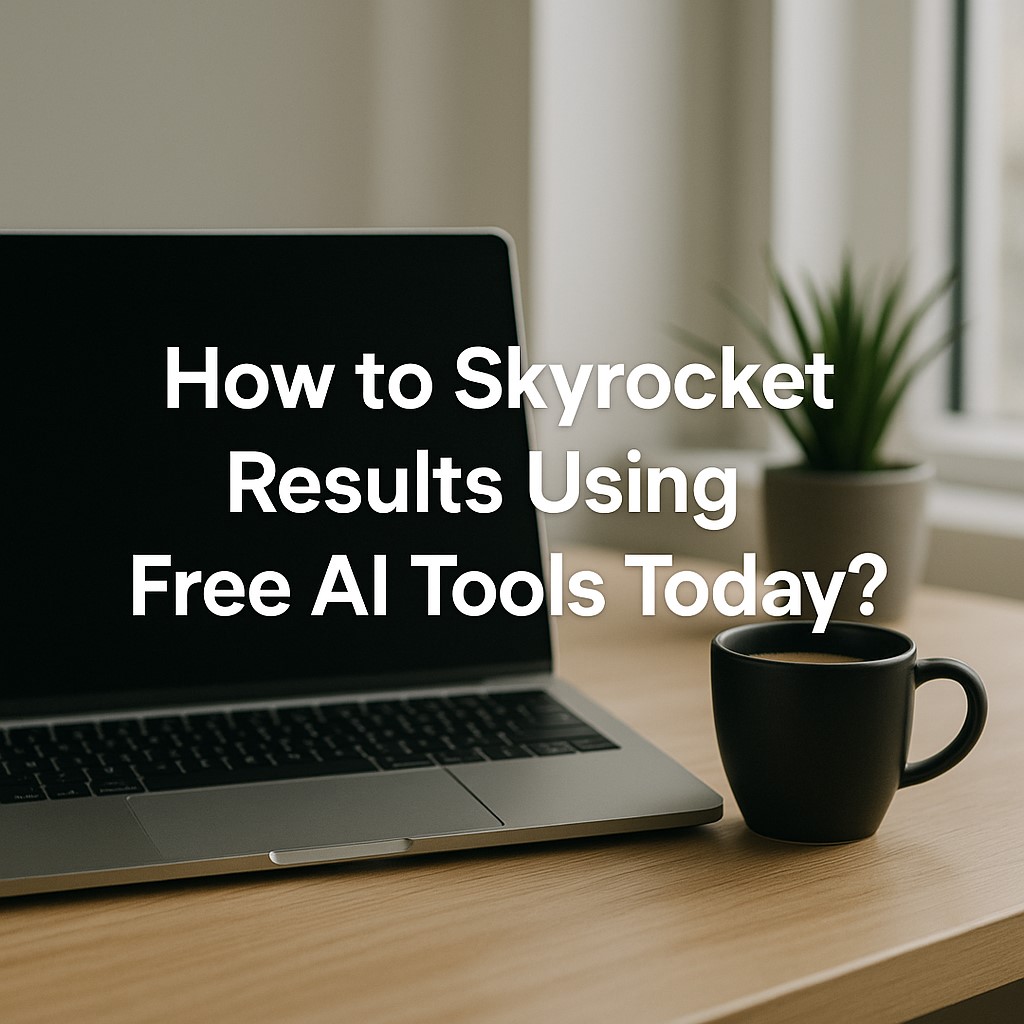Discover how AI applications in healthcare are making treatments smarter, faster, and easier, helping doctors and patients tackle health challenges like never before.
Have you ever wondered how doctors make quick, life-saving decisions? Or how they spot diseases early, even before you feel sick? Well, it’s not all about superpowers or guesswork. These days, technology plays a huge role, especially AI applications in healthcare.
AI, short for artificial intelligence, is like a smart helper for doctors, nurses, and hospitals. It helps them analyze tons of data in seconds. This means they can detect patterns, predict illnesses, and even suggest treatments faster than ever. AI applications in healthcare are not about replacing doctors. They’re about giving them powerful tools to make smarter, safer, and quicker choices.
Why does this matter? AI applications in healthcare are changing the way we experience medicine. From virtual checkups to personalized treatments, AI is helping people get better care. It makes healthcare more accurate, affordable, and accessible for everyone, including you.
Table of contents
- How do AI applications in healthcare boost early detection?
- AI applications in healthcare for predictive analytics
- AI applications in healthcare vs. traditional diagnostics
- AI applications in healthcare: powering drug discovery
- AI applications in healthcare and patient monitoring tech
- Top AI applications in healthcare for disease prediction
- AI applications in healthcare: NLP in medical records
- AI applications in healthcare that improve telemedicine
- AI applications in healthcare for clinical decision support
- AI applications in healthcare and data security issues
- FAQs: AI applications in healthcare
- Conclusion
How do AI applications in healthcare boost early detection?
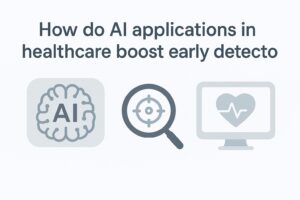
Smarter tools for faster diagnosis
AI applications in healthcare are changing how doctors spot diseases. They help find health problems early, sometimes even before symptoms show. That’s a big deal because early detection means treatment can start sooner, and outcomes can be much better.
How AI helps in early detection
AI systems can scan medical images like X-rays, MRIs, and CT scans much faster than humans. They don’t get tired and can notice tiny changes that even experts might miss. For example, AI tools in healthcare can help doctors spot early signs of cancer by picking up patterns in images that would take a person hours to see.
AI applications in healthcare also use predictive analytics. These systems study past data to predict future health issues. For example, AI can look at your medical records and lifestyle data to predict if you might develop diabetes or heart problems. This way, patients can make changes before things get serious.
Real-life examples
One cool example is how AI helps detect diabetic eye disease. AI apps can scan a photo of the back of your eye and tell if you have early signs of damage. Another example is AI tools that monitor heart rhythms and alert doctors if they see dangerous patterns. These AI applications in healthcare give patients and doctors a head start in preventing bigger health issues.
AI applications in healthcare are also used in wearable devices. Smartwatches and fitness bands use AI to track your health data. They send warnings if something seems wrong, like irregular heartbeats. These everyday tools make early detection easy and personal.
Why does it matter for young people?
For students and young people, this is exciting. You might not think about diseases yet, but AI is making sure you stay ahead. Knowing how AI applications in healthcare work can help you make smarter choices and understand the tech that might save lives — even your own someday.
AI applications in healthcare for predictive analytics
Predicting health problems before they happen
AI applications in healthcare are not only about treating diseases. They are also helping doctors predict who might get sick in the future. This is called predictive analytics, and it’s a game-changer for healthcare.
How does predictive analytics work with AI?
AI systems can look at tons of health data, like patient histories, lab results, and even data from fitness trackers. By studying these patterns, AI can tell if a person is at risk for certain diseases, like diabetes or heart issues.
For example, if someone’s data shows high blood pressure and poor sleep patterns, AI can flag that they might develop heart problems. This lets doctors step in early, giving advice or treatment before the issue becomes serious.
AI applications in healthcare make this process faster and more accurate than old-school methods. Instead of waiting for symptoms, doctors and patients can act early.
Everyday examples of predictive AI
Many hospitals now use AI to predict which patients might need extra care after surgery. This helps doctors plan better and keeps patients safer.
Some AI apps also help people manage their health by sending reminders or alerts. For example, if an AI system sees your fitness data drop, it might remind you to get active again. These AI applications in healthcare keep people aware of their health in a simple, friendly way.
Why should students care?
Predictive analytics might sound complex, but it’s all around us. From smartwatches to fitness apps, AI is already helping people stay healthy. Learning about how AI applications in healthcare work with predictive analytics gives you a sneak peek into how your health can be managed smarter in the future.
AI applications in healthcare vs. traditional diagnostics
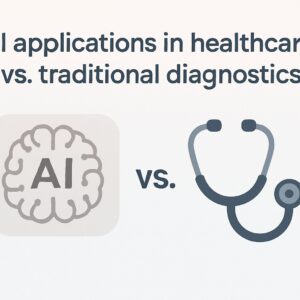
A faster, smarter way to find diseases
AI applications in healthcare are changing the way doctors diagnose diseases. In the past, traditional methods relied mostly on human skills and experience. Today, AI adds extra brainpower to help doctors make faster and more accurate decisions.
Speed and accuracy differences
Traditional diagnostics often involve long tests, waiting for lab results, and depending on how much a doctor can see or guess. This process can take days or even weeks.
On the other hand, AI applications in healthcare can analyze medical images, blood tests, and health data in minutes. For example, AI tools can scan an X-ray and spot lung infections much quicker than a doctor reviewing it manually. This speed helps patients get treatment sooner.
Smarter pattern recognition
AI applications in healthcare are also great at spotting patterns that humans might miss. Traditional diagnostics depend on what doctors have seen before, but AI can learn from millions of past cases. This means it can pick up rare or hidden signs that would otherwise be overlooked.
For example, AI can detect tiny changes in a brain scan that could point to early stages of a disease like Alzheimer’s. This kind of detail is hard to see with just human eyes.
Why does this matter to young people?
For students and young adults, it’s cool to see how tech is boosting healthcare. AI applications in healthcare give doctors more tools to help patients faster and better. It’s like having a super assistant that never gets tired or misses a thing.
Understanding how AI compares to traditional methods also shows how the future of healthcare will work — with humans and AI working together.
AI applications in healthcare: powering drug discovery
Finding new medicines faster with AI
AI applications in healthcare are not just helping doctors—they are also speeding up how we find new medicines. Drug discovery used to take years, but now, AI is making the process much quicker and smarter.
How AI helps discover new drugs?
In traditional drug discovery, scientists test thousands of chemical compounds to see if any can fight a disease. This takes a lot of time, money, and guesswork.
But AI applications in healthcare can analyze huge amounts of data and predict which compounds might work, saving time and effort. These smart systems study patterns in how diseases work, what molecules can target them, and how the human body might react.
For example, AI tools can predict if a new drug will have side effects or not even before testing it on people. This helps researchers focus only on the most promising options.
Real-life examples of AI in drug discovery
AI played a big role in the search for COVID-19 treatments. AI applications in healthcare helped researchers find drugs that could be repurposed to fight the virus quickly. What used to take years now took months.
AI is also being used to discover treatments for cancer and rare diseases. This is giving hope to patients who used to wait for years for new options.
Why does it matter to students?
For students, it’s exciting to see how AI applications in healthcare are cutting down the time needed to find cures. It shows how tech can save lives and change how medicine works.
Understanding how AI powers drug discovery also gives young people a look at future careers where tech and healthcare mix together.
AI applications in healthcare and patient monitoring tech
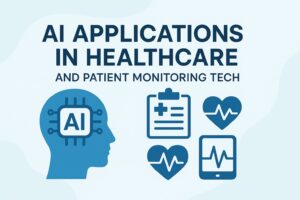
Keeping an eye on patients, even from a distance
AI applications in healthcare are making patient monitoring smarter and more proactive. In the past, doctors could only check a patient’s health during hospital visits. Now, AI-powered systems can watch over patients 24/7, even when they’re at home.
Smarter health tracking with AI
Wearable devices like smartwatches and fitness trackers are not just for counting steps anymore. They now work with AI applications in healthcare to track important health data like heart rate, oxygen levels, and sleep patterns.
AI systems analyze this data in real-time and alert doctors if something unusual happens. For example, if someone’s heart rate spikes while they are resting, AI can flag it immediately, helping doctors act before the situation gets serious.
AI makes healthcare proactive, not reactive
One of the coolest things about AI applications in healthcare is how they shift patient monitoring from reactive to proactive. Instead of waiting for patients to report symptoms, AI tools can predict potential health problems early.
This helps people stay healthier for longer, and it reduces the need for emergency care. It also means doctors can manage more patients at once, thanks to AI handling the routine checks.
Why does this tech matter to young people?
For students and young adults, these AI applications in healthcare show how tech can help people take charge of their health. Many already use health apps on their phones. Now, those apps are becoming even smarter, thanks to AI.
It also opens up future jobs in areas where tech, healthcare, and AI come together to create safer, smarter systems.
Top AI applications in healthcare for disease prediction
Predicting illnesses before they happen
AI applications in healthcare are not just about treating diseases. They are now helping doctors predict them before symptoms even appear. This is a huge game-changer for keeping people healthier and saving lives.
How does AI predict diseases early?
AI applications in healthcare use data from health records, wearable devices, and lab tests to spot patterns that humans might miss. These smart tools can predict risks for diseases like diabetes, heart problems, or even cancer.
For example, if your smartwatch tracks your sleep and heart rate, AI can analyze that data and warn you if it spots patterns linked to certain illnesses. This allows you to make changes early, like improving your diet or visiting your doctor.
AI helps doctors make faster, better decisions AI applications in healthcare
AI applications in healthcare also support doctors by giving them early warnings based on patient data. This means they don’t have to wait for patients to feel sick. Instead, AI helps doctors step in early, giving treatments that can prevent the illness from becoming serious.
Many hospitals already use AI systems to monitor patient records and flag high-risk cases, helping doctors manage care better and faster.
Why does it matter for young people?
For students and young adults, AI applications in healthcare show how tech is reshaping how we look at health. Instead of reacting when we feel bad, AI helps us stay ahead of the curve.
Plus, it’s exciting to think about future careers in this space, where AI, healthcare, and data science work together to keep people healthy.
AI applications in healthcare: NLP in medical records
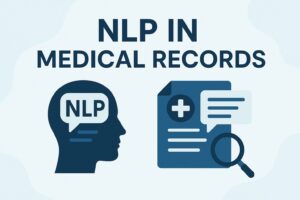
Making sense of health data with AI AI applications in healthcare
AI applications in healthcare are improving how medical records are handled. Doctors and nurses write tons of notes about patients every day. These notes are full of important info but can be hard to organize and read quickly.
Natural language processing (NLP) is a type of AI that helps computers understand and work with human language. In healthcare, NLP reads and sorts medical records so doctors can find what they need faster.
How does NLP speed up healthcare work?
NLP in AI applications in healthcare scans through patient files to find key details like symptoms, medications, and past treatments. This saves time and reduces mistakes. Instead of reading pages of notes, doctors get a clear summary in seconds.
For example, if a patient has allergies or a history of heart issues, NLP highlights this so doctors don’t miss it during treatment.
Why NLP matters for patients and doctors?
Using AI applications in healthcare with NLP means better care for patients. Doctors get quick access to important info and can make smarter decisions faster. It also means less paperwork and more time spent helping patients.
For students interested in tech and health, NLP shows how AI can handle language, making medical work easier and safer.
Real-life impact of NLP in healthcare
Hospitals and clinics worldwide use NLP tools every day. These AI applications in healthcare improve how patient info is recorded, searched, and used. This leads to faster diagnoses and better treatment plans. NLP is an important part of the AI revolution in healthcare.
AI applications in healthcare that improve telemedicine
Making virtual care smarter and easier AI applications in healthcare
AI applications in healthcare are changing how telemedicine works. Telemedicine lets patients talk to doctors online instead of visiting clinics. AI tools now make these virtual visits faster, safer, and more effective.
AI helps with quick diagnosis during telehealth
During an online appointment, AI applications in healthcare can analyze symptoms and patient data right away. This helps doctors give faster advice or decide if a patient needs in-person care.
For example, AI chatbots can ask patients important questions before the doctor joins the call. This saves time and makes sure the doctor has all the info they need.
Better monitoring and follow-up with AI
After a telemedicine visit, AI applications in healthcare help monitor patients remotely. Wearable devices can send health data to doctors automatically. AI analyzes this data to spot any problems early.
If something seems wrong, the system alerts the doctor or patient. This means better follow-up care without extra hospital visits.
Why does eMedicine with AI matter now?
Especially since 2020, telemedicine has become a popular way to see doctors. AI applications in healthcare make it even better by improving accuracy and convenience.
For young people, this means easier access to health advice without long waits or travel. It also shows how AI can help healthcare become more flexible and patient-friendly.
AI applications in healthcare for clinical decision support
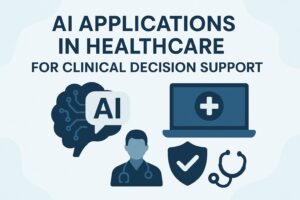
Helping doctors make smarter choices
AI applications in healthcare are becoming a big help in clinical decision support. This means AI tools assist doctors by providing useful advice based on data. It helps doctors decide the best treatments for patients faster and more accurately.
How does AI support doctors in real time?
With AI applications in healthcare, doctors get instant suggestions during patient exams. The AI looks at symptoms, test results, and medical history to recommend possible diagnoses or treatments. This cuts down guesswork and speeds up care.
For example, if a doctor is unsure about a diagnosis, AI can highlight likely conditions to check first. This keeps mistakes low and helps patients get the right care sooner.
AI improves teamwork in healthcare
AI applications in healthcare also connect different specialists by sharing insights. When doctors, nurses, and other staff use AI tools, they work better as a team. Everyone gets the same clear information, so patient care is smoother and safer.
This teamwork means less confusion and faster decisions, which is super important in emergencies or complex cases.
Why does his matter for young people?
For students interested in healthcare, AI applications in healthcare for decision support show how tech is changing medicine. It’s not about replacing doctors but helping them be their best.
Plus, these AI tools make healthcare smarter and more reliable, improving how patients feel and recover.
AI applications in healthcare and data security issues
Keeping patient info safe in a digital world
AI is changing healthcare in amazing ways, but it also brings some worries about data safety. Medical records and personal info are super private. If that info leaks or gets hacked, it can cause big problems for patients.
Risks of data breaches with AI
AI applications in healthcare need a lot of sensitive info to work well. But that data can be a target for hackers if it’s not protected properly. A data breach could reveal things like health history or even social security numbers. That’s why hospitals and companies have to use strong security to keep everything safe.
How does AI help improve data security?
The cool thing is, AI itself can help protect data too. It can spot strange activity or possible hacks quickly and alert security teams right away. AI learns from past attacks and gets better at stopping new threats over time.
Balancing innovation with safety
Using AI applications in healthcare means finding the right balance. We want all the benefits of new tech but also have to protect patient privacy. That’s why doctors, developers, and hospitals follow strict rules to keep data safe while still using AI to improve care. For anyone interested in health tech, this shows how important it is to think about both security and innovation.
FAQs: AI applications in healthcare
What are AI applications in healthcare?
AI applications in healthcare are smart computer tools that help doctors and nurses do their jobs better. These tools can look at medical images, predict diseases, and suggest treatments. They save time and help healthcare workers make faster and safer decisions.
How do AI applications in healthcare help with diagnosis?
They analyze data like X-rays, scans, and test results. AI can spot patterns that humans might miss. This means doctors can catch illnesses earlier and plan treatments sooner. Many hospitals already use these tools to support daily care.
Are AI applications in healthcare safe to use?
Yes, but they must follow strict rules. Healthcare teams test these tools carefully before using them with real patients. Also, AI doesn’t replace doctors—it helps them make better choices. Keeping patients safe is always the priority.
Can AI applications in healthcare protect patient data?
Absolutely. AI doesn’t just help with treatments—it also improves data security. It can watch for strange activity and warn teams if something looks wrong. This helps keep sensitive information, like medical records, safe from hackers.
Will AI applications in healthcare replace human doctors?
Nope! AI is here to assist, not replace. It can handle lots of data quickly, but it still needs human doctors to make final decisions. AI makes healthcare more efficient, but the human touch stays important.
How do AI applications in healthcare make care more personal?
AI can study a person’s health records and suggest treatments that fit their unique needs. This helps doctors offer care that’s more personal and accurate. It’s like having a smart assistant that remembers every detail about your health.
Conclusion
AI applications in healthcare are changing how doctors and nurses work every day. These tools help make faster diagnoses, safer treatments, and more personalized care.
Students like you might see even more exciting AI applications in healthcare shortly. From smart devices that monitor patients to tools that protect health data, AI is becoming a big part of hospitals and clinics.
By understanding AI applications in healthcare, you can see how technology supports better health for everyone. It also opens up cool career paths if you like tech or medicine.
So, next time you visit a doctor, think about how AI might be working quietly behind the scenes to keep you healthy.

